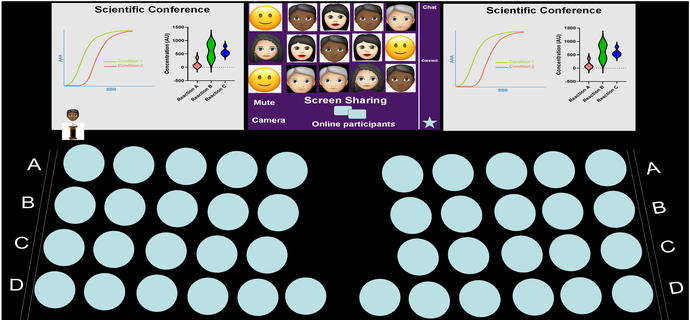Author: Gayathri Delanerolle, Digital Evidence Based Medicine Lab and the Southern Health NHS Foundation Trust Despite over 60 years of human space…
Let’s welcome back onsite scientific conferences coupled with online attendance option
 Image credit to the author: Rafiou Agoro
Image credit to the author: Rafiou AgoroAuthor: Rafiou Agoro, Postdoctoral fellow, Department of Medical and Molecular Genetics at Indiana University School of Medicine
As I was navigating my second year as a postdoctoral fellow at New York University, the time came to attend the annual meeting of the American Society of Bone and Mineral Research (ASBMR), the world’s largest meeting in the bone, mineral and musculoskeletal research field. The 2018 annual meeting was scheduled to be held in September in Montreal. I was excited to attend a such big event and thrilled to share my ongoing scientific contributions with peers as well as to receive feedbacks from senior and established investigators.
On April 11th, 2018, my colleagues and myself submitted our abstracts, and all of us were looking forward to an incredible scientific experience in Canada. After the submission, colleagues of mine who are from European countries were just waiting for months to pass to jump on a plane or drive 6 hours to get to Montreal. On my side, additional struggles just started as I had to search about the procedure to get a visa to travel to Canada as a Togolese citizen. Unlike my European colleagues with the same professional title and under the same immigration status in the United States, in my case, I needed an additional stamp on my passport.
Here we go. I started to set daily times aside after my working day to learn about how to apply and get a Canadian visa. I had experiences on applying for visa for conferences as graduate student in different countries and I knew how emotional this can be especially if your career development perspectives depend on a visa decision. I turned to Google to find helpful tips by searching for “applying for Canada Visa in New York City”.
My online searches identified a private company with formal contracts with Canadian government to provide visa services. After reading careful the instructions, I gathered required documents, which are overall more stringent for African citizen, and found a time slot for an appointment. On August 10th, 6 weeks before the kickoff of the conference, I took a half-day off from the lab and headed to my visa application interview in downtown Manhattan near Grand Central to submit my application.
Although I knew that I would need the visa to travel to Canada, at that moment it became clear that my scientific perspectives and plans based on this conference will depend on my ability to get this “Give Way” stamp which, by the way, I had to pay 185 CAD from my own pocket. A month after the application, I received a call from the agency inviting me to schedule a new appointment to come to receive my passport and visa decision.
I scheduled a new appointment and went back to the agency during a working day with the hope that I could finally have my head settled and start preparing my conference by completing the registration, hotel reservations and plane tickets. All these fees were increasing day after day. At the agency, they gave me my passport in an envelope and instructed me to open the envelope outside the agency. Once outside the building, in the middle of human-crowdy and traffic-noisy midtown Manhattan, I open the envelop and was relieved to have, finally, the formal authorization to prepare my upcoming 3-day conference in Canada.
Since my last visa-required conference, I have attended other meetings in the US in 2019 and 2020 in a much relax ways. However, in fall 2021, I am planning to attend another ASBMR meeting in Toronto, and I will again repeat the visa application process. With the hope to repeat the same successful application as in 2018 without unexpected difficulties.
Based on my experience, and as others have likely faced similar challenges without a favorable outcome, scientific meeting committees should offer viable and alternative solutions for scientists who for whatever reasons could not attend scientific events in person. It is likely that scientists across the world have missed opportunities to share their key findings with peers due to administrative processes issues or because of the lack of means to afford travel, registration, and accommodations fees.
From now on, as we are preparing to get back to normal scientific conferences activities after COVID19 pandemic, I really hope that the resumption of onsite conferences events will be coupled with an online format attendance, an alternative option which will also promote scientific inclusion.